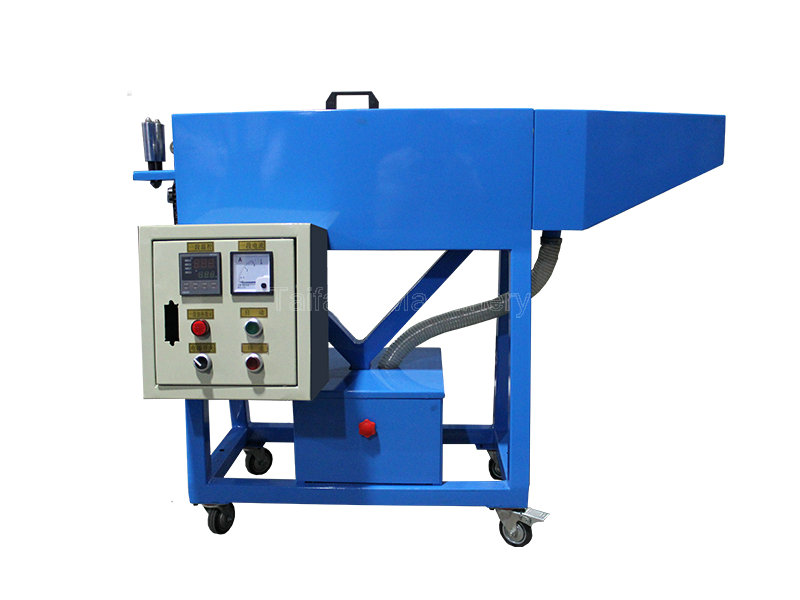熱門關(guān)鍵詞:
聯(lián)系人:Mr.Zhong
郵 箱:121740864@qq.com
電 話:+86-138-1293-0229
地 址:579 Qianjin East Road, Kunshan Development Zone, Jiangsu Province

Operating instructions/common abnormalities and countermeasures for the powder feeder
A. Precautions for operating the powder feeder
1. Before starting the machine, it is necessary to check whether the power supply of the powder machine is consistent with the power supply of the extruder socket. Only after confirming that there are no errors can the power supply be plugged in.
2. After the powder feeder is powered on, immediately inspect the rotating system and heating system. After confirming that there are no errors, turn on the electric heating switch and dry the talc powder at a temperature of 150 ℃ (completed 1.5 hours before extrusion). 30 minutes before production, lower the temperature to the range of 60+20/-10 ℃ at a constant temperature for use
3. Prepare sufficient talcum powder before production. The amount of talcum powder should be 70% -90% of the capacity of the powder passing machine. During production, check whether the amount of talcum powder is sufficient at least once an hour, and add it promptly if insufficient
4. During production, it is important to ensure that the wire passes through the middle of each guide wheel of the powder feeder to avoid poor wire powder passing caused by semi-finished product shaking
5. Selection of extruded inner mold for powder coated wire: Enlarge it by 0.05-0.2M/M according to the usual standard (as powder coating will occupy a certain gap, and a small inner mold can cause poor appearance and easy wire breakage)
B. Common abnormalities and countermeasures
1. Poor peeling:
a. Too little powder, talcum powder is not completely dry, and a sufficient amount of well dried talcum powder needs to be added
b. If the distance between the inner and outer molds is too far and the protrusion is too substantial, it is necessary to reduce the distance between the inner and outer molds
n. The outer diameter of the semi-finished product stranding is too small to be easily powdered: stranding and extrusion are treated with an appropriate amount of release agent before being powdered
2. Appearance defects caused by excessive powder:
a. Talcum powder accumulates too much in the inner mold duct, obstructing the smooth operation of semi-finished products and causing poor appearance. It is necessary to use an air gun to blow dry the talcum powder inside the inner mold duct
b. When the brush has not brushed off excess talcum powder, the semi-finished product should be placed in the center of the brush so that the brush can remove excess talcum powder
c. The internal mold is too small: Due to the larger usage of the powder wire internal mold compared to the powder wire (of the same specification), it is easy to choose an internal mold with a pore size 0.05-0.2M/M larger than usual during production
3. Core wire adhesion:
a. Insufficient cooling: The outer layer of the powder line is generally thick, and due to insufficient cooling during production, it is easy to cause core wire adhesion. During production, each section of the water tank should maintain sufficient cold water to achieve sufficient cooling
b. Insulated PVC melts at high temperatures, resulting in core wire adhesion: the core wire is extruded, and an appropriate amount of release agent is used during stranding. Before being extruded, the release agent is used before being powdered, or when being extruded, the stranding is improved by being powdered.